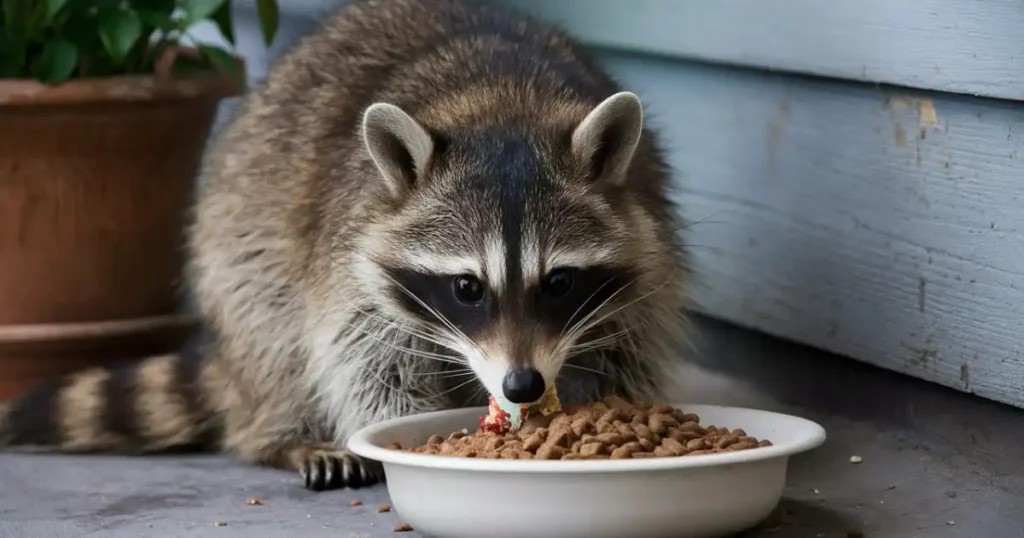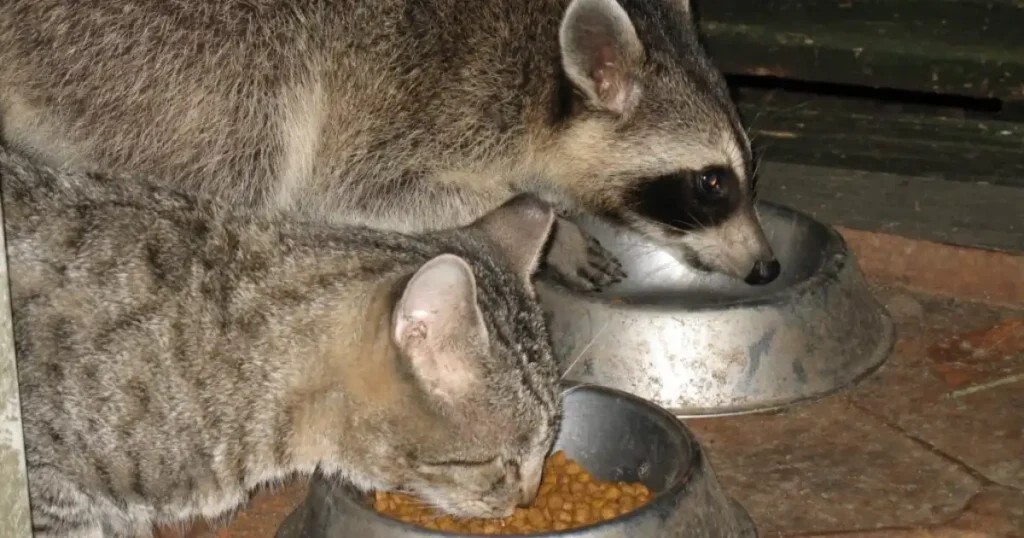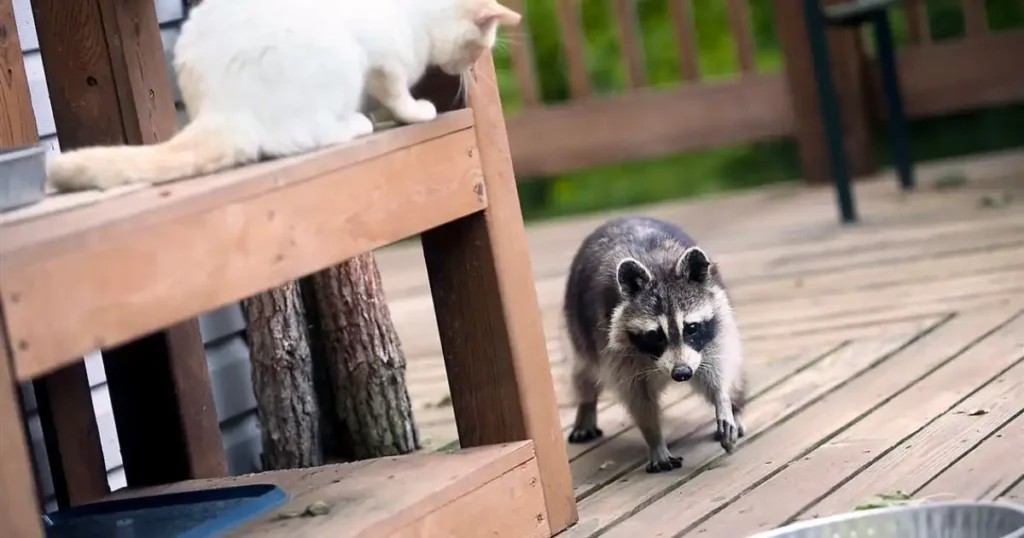Can Raccoons Eat Cat Food? Yes, they can, but it’s not ideal. This detailed guide from FOODS.EDU.VN explores the dietary habits of raccoons, the dangers of feeding them cat food, and effective prevention strategies. Learn how to protect your pets and property from these clever foragers with insights into raccoon nutrition, raccoon behavior, and safe wildlife removal.
1. Understanding Raccoon Dietary Habits
Raccoons are incredibly adaptable omnivores, consuming a diverse range of foods in the wild. Their diet typically includes fruits, nuts, berries, insects, small mammals, fish, and even carrion. They adjust their food choices according to seasonal availability. However, they are also opportunistic scavengers, readily exploiting human-provided food sources like pet food. The versatility in their diet and adaptability in foraging make them successful urban dwellers, often to the dismay of homeowners.
1.1 Why Cat Food Appeals to Raccoons
Cat food, whether dry kibble or moist canned varieties, is a veritable feast for raccoons due to its high protein and fat content. This rich nutritional profile is extremely attractive to these resourceful creatures. The potent aroma of cat food can draw raccoons from considerable distances, turning your outdoor cat feeding area into a raccoon buffet. If you routinely feed your cat outdoors, it’s almost inevitable that raccoons will discover this convenient food source and become frequent visitors to your property.
Raccoons possess an exceptional sense of smell, allowing them to locate food sources with remarkable accuracy. Once they identify your home as a reliable source of sustenance, they are likely to return repeatedly, potentially causing more extensive problems than simply emptying the cat food bowl. This can lead to property damage, confrontations with pets, and other unwelcome issues.
2. Is Cat Food a Healthy Choice for Raccoons?
While raccoons are physically capable of eating cat food and obtaining some nutritional value from it, there are several significant concerns associated with allowing or encouraging this behavior. A balanced diet is crucial for the health of any animal, and cat food simply doesn’t cut it for raccoons.
2.1 Nutritional Deficiencies in Raccoons
Cat food is expertly formulated to meet the specific nutritional requirements of domestic cats, which are obligate carnivores with a diet heavily reliant on animal protein. Raccoons, on the other hand, have a more varied dietary need in their natural habitat. Over-reliance on cat food can result in nutritional imbalances for raccoons, as it may lack the essential vitamins, minerals, and fiber necessary for their optimal health. This can lead to various health problems over time.
2.2 Potential Health Risks for Raccoons
Regular consumption of cat food can contribute to several health problems in raccoons. One of the most common issues is obesity. The high-fat content in cat food, while beneficial for cats, is not suitable for raccoons and can lead to unhealthy weight gain and related complications such as diabetes and heart disease. Moreover, raccoons that become dependent on human-provided food sources may lose their natural ability to forage efficiently in the wild, making them more vulnerable if these food sources are removed.
2.3 Risk of Disease Transmission
Feeding raccoons cat food also increases the risk of disease transmission to both the raccoons themselves and your domestic pets. Raccoons are known carriers of various diseases, including rabies, distemper, leptospirosis, and raccoon roundworm. By attracting raccoons to your property, you elevate the likelihood of disease transmission to your pets, especially if they come into contact with raccoon saliva, urine, or feces. This can pose a serious health risk to your beloved animals.
3. Ecological Impact of Feeding Raccoons
Encouraging raccoons to feed on cat food can have far-reaching and unintended consequences on the local wildlife ecosystem. Raccoons are naturally aggressive and territorial animals, and their increased presence can disrupt the delicate balance of nature.
3.1 Disruption of Local Wildlife Behavior
For instance, raccoons may outcompete smaller mammals and birds for food resources, leading to a decline in biodiversity within the area. Their aggressive nature can also intimidate other animals, altering their natural foraging and breeding behaviors. This can have a cascading effect on the entire ecosystem.
3.2 Increased Human-Wildlife Conflicts
Additionally, raccoons that become accustomed to human-provided food sources are more likely to venture into urban areas, increasing the chances of encounters and conflicts with humans and domestic animals. This can result in property damage, aggressive encounters, and the potential spread of diseases.
4. Effective Strategies to Prevent Raccoons from Eating Cat Food
If you are concerned about raccoons consuming your cat’s food, there are numerous proactive steps you can take to effectively prevent this from happening. These strategies not only protect your pet’s food but also help safeguard your property and the local wildlife.
4.1 Feeding Cats Indoors: The Ultimate Solution
The most effective and straightforward way to prevent raccoons from accessing cat food is to exclusively feed your cats indoors. This simple change eliminates the opportunity for raccoons to discover and consume the food. Furthermore, feeding your cats indoors protects them from potential encounters with wild animals, reducing the risk of injuries or disease transmission.
4.2 Prompt Removal of Leftover Food
If feeding your cat indoors is not a feasible option, it is crucial to remove any uneaten food promptly after your cat has finished eating. Leaving food out overnight is essentially an open invitation to raccoons and other opportunistic wildlife. By diligently removing the food, you eliminate the attraction and reduce the likelihood of raccoons visiting your property.
4.3 Investing in Raccoon-Proof Feeding Stations
Consider investing in a specially designed raccoon-proof feeding station if you must feed your cats outdoors. These innovative feeding stations are engineered to be accessible only to smaller animals, such as cats, while effectively preventing raccoons from reaching the food. The design often includes features like elevated platforms, small entryways, or weight-activated doors that deter raccoons.
4.4 Securing Trash Bins and Compost Heaps
In addition to cat food, raccoons are attracted to a variety of other food sources, including trash and compost. It is imperative to ensure that your trash bins have secure, tight-fitting lids that cannot be easily opened or tipped over by raccoons. Compost piles should be kept in raccoon-proof containers or enclosed within a secure structure to prevent them from becoming an additional food source for these resourceful creatures.
5. Enhanced Measures to Safeguard Your Property
Beyond securing cat food and other potential food sources, you can implement additional measures to further deter raccoons from entering your property and causing damage. These strategies create a less welcoming environment for raccoons, encouraging them to seek food and shelter elsewhere.
5.1 Strategic Installation of Motion-Activated Lights
Raccoons are primarily nocturnal animals, meaning they are most active during the nighttime hours. Installing motion-activated lights around your property can effectively startle and deter raccoons from approaching. These lights should be strategically placed near trash bins, outdoor feeding stations, potential entry points to your home, and any other areas where raccoons are likely to visit. The sudden burst of light will discourage them from lingering and potentially causing trouble.
5.2 Utilizing Ultrasonic Repellents
Ultrasonic repellents emit high-frequency sounds that are unpleasant and irritating to raccoons, but typically inaudible to humans. These devices can serve as an effective deterrent when strategically placed around your property. It is essential to position them correctly and ensure they cover the areas where raccoons are most likely to enter or congregate. While ultrasonic repellents can be effective, it’s important to note that their effectiveness may vary depending on the specific device and the individual raccoon.
5.3 Sealing Potential Entry Points
Raccoons are remarkably agile climbers and can squeeze through surprisingly small openings. To prevent raccoons from gaining access to your home, conduct a thorough inspection of the exterior of your house to identify any potential entry points. These may include gaps in the roof, chimneys, vents, crawl spaces, or loose siding. Use durable materials such as heavy-gauge mesh or metal flashing to securely seal these openings, preventing raccoons from entering your home and causing damage.
5.4 Pruning Trees and Shrubs
Raccoons often utilize trees and overgrown shrubs as convenient pathways to reach roofs and other elevated areas of your home. By trimming any branches that extend close to your house, you can significantly reduce the likelihood of raccoons gaining access to your roof or attic. This simple maintenance task eliminates a common access point for these resourceful creatures.
5.5 Eliminating Standing Water Sources
In addition to food, raccoons are also attracted to sources of water. Make sure to remove or cover any standing water, birdbaths, or pet water dishes that are left outside overnight. This will make your property less appealing to raccoons searching for a drink. Eliminating water sources deprives them of a vital resource, encouraging them to seek it elsewhere.
6. Understanding Raccoon Behavior: The Key to Prevention
Raccoons are highly intelligent animals with complex behaviors. Once they discover a reliable food source, they are likely to return repeatedly, demonstrating their ability to learn and adapt. This can lead to habituation, where raccoons become less fearful of humans and more brazen in their attempts to access food. Over time, this can result in increased property damage and the potential for conflicts with pets or even humans.
6.1 The Importance of Consistent Prevention Efforts
Preventing raccoons from accessing food on your property requires consistent effort and vigilance. If you inadvertently leave food out even occasionally, raccoons will quickly learn to associate your property with easy meals. Consistency in removing food sources and maintaining deterrents is essential to successfully discouraging raccoons from visiting your home and causing problems.
6.2 Addressing Persistent Raccoons
Despite your best efforts, a particularly persistent raccoon may continue to visit your property, demonstrating its determination and resourcefulness. When this occurs, it’s essential to seek professional assistance from a humane wildlife removal company like Critter Stop. Critter Stop has earned a stellar reputation and outstanding customer reviews online due to its commitment to high-quality work and exceptional customer service. Their team of experienced professionals can safely and humanely remove the troublesome raccoon and help you implement additional measures to prevent future incursions.
7. Safe Encounters: What to Do If You See a Raccoon
While raccoons are generally not aggressive towards humans, it’s crucial to exercise caution and maintain a safe distance if you encounter one. Here are some essential guidelines for safely dealing with a raccoon on your property:
7.1 Stay Calm and Maintain Distance
Raccoons are wild animals and should be treated with respect. If you see a raccoon, remain calm and avoid making sudden movements that could startle or provoke it. Keep your distance and provide the raccoon with ample space to retreat.
7.2 Avoid Approaching or Feeding
Never attempt to approach, feed, or handle a wild raccoon, regardless of how friendly or unafraid it may appear. Remember that it is still a wild animal and could react unpredictably if it feels threatened or cornered. Feeding raccoons can encourage them to return, leading to more frequent and potentially dangerous encounters.
7.3 Use Noise to Encourage Departure
If a raccoon is lingering on your property and you want to encourage it to leave, you can often do so by making loud noises. Clapping your hands, banging pots, or using an air horn can create a disturbance that the raccoon will find unpleasant. Raccoons are generally wary of loud, unfamiliar sounds and will likely retreat to a safer location.
8. Addressing Common Concerns: FAQs About Raccoons and Cat Food
Here are some frequently asked questions about raccoons and their consumption of cat food, providing clear and concise answers to address common concerns:
8.1 Is cat food bad for raccoons?
Yes, cat food can be detrimental to the health of raccoons. While raccoons may readily consume cat food, it is not nutritionally balanced to meet their specific dietary needs. Cat food is formulated specifically for domestic cats, which are obligate carnivores, and may lack essential nutrients that raccoons require to maintain their health and well-being. Over time, a diet primarily consisting of cat food can lead to nutritional deficiencies and various health issues in raccoons, such as obesity and other diet-related problems.
8.2 Do raccoons eat cat food?
Yes, raccoons are opportunistic feeders and will readily consume cat food if given the opportunity. Raccoons are highly adaptable and will take advantage of any readily available food source they can find, including cat food that is left outside. The strong smell and high protein content of cat food are particularly attractive to raccoons, making it a common target for them when they roam through residential areas in search of food.
8.3 Do raccoons like cat food?
Raccoons do indeed exhibit a fondness for cat food. The high protein and fat content found in cat food make it appealing to raccoons, who are always on the lookout for easily accessible and energy-rich foods. This attraction often leads raccoons to frequent areas where cat food is left out, especially in outdoor feeding stations or around homes where cats are fed outdoors.
| Question | Answer |
|---|---|
| Is cat food bad for raccoons? | Yes, it can lead to nutritional imbalances and health issues like obesity. |
| Do raccoons eat cat food? | Yes, they are opportunistic and will eat it if available. |
| Do raccoons like cat food? | Yes, the high protein and fat content make it appealing. |
| What diseases can raccoons transmit? | Rabies, distemper, leptospirosis, and raccoon roundworm are some of the diseases they can carry. |
| How can I prevent raccoons from eating it? | Feed cats indoors, remove leftover food, use raccoon-proof feeders, and secure trash bins. |
| Are ultrasonic repellents effective? | They can be a deterrent but may not work for all raccoons. |
| What should I do if I see a raccoon? | Stay calm, keep your distance, and make noise to encourage it to leave. |
| Can raccoons climb? | Yes, they are excellent climbers. |
| What attracts raccoons to my property? | Food sources like cat food, trash, compost, and water sources. |
| Are raccoons aggressive? | Generally not towards humans, but it’s important to exercise caution. |




9. Critter Stop: Your Partner in Raccoon Removal
Raccoons, renowned for their cunning behavior and ability to inflict significant damage, frequently invade properties in search of food and shelter. Whether they are raiding trash cans, damaging property, or posing a threat to your pets, raccoons can quickly become a serious nuisance for homeowners. When confronted with the challenging task of managing raccoon infestations, Critter Stop is the reliable solution you need.
At Critter Stop, we have been providing professional raccoon removal services for many years in the North Texas area, helping countless customers protect their families, pets, and property from the damages caused by these resourceful creatures. Our team of experienced and highly trained wildlife removal specialists employs humane and effective techniques to safely remove raccoons from your property and implement preventative measures to ensure they do not return.
If raccoons are causing problems on your property, know that there are humane and ethical ways to address the issue. Contact Critter Stop today to schedule a consultation and receive a free estimate for our comprehensive raccoon removal services. We are committed to providing you with peace of mind and a raccoon-free environment.
Critter Stop
Address: 1946 Campus Dr, Hyde Park, NY 12538, United States
Whatsapp: +1 845-452-9600
Website: FOODS.EDU.VN
Don’t let raccoons disrupt your peace of mind. Visit FOODS.EDU.VN for more insights and expert advice on managing wildlife and creating a harmonious living environment. Let foods.edu.vn be your trusted resource for all your culinary and home-related needs. Discover a wealth of information and expert advice to elevate your lifestyle.